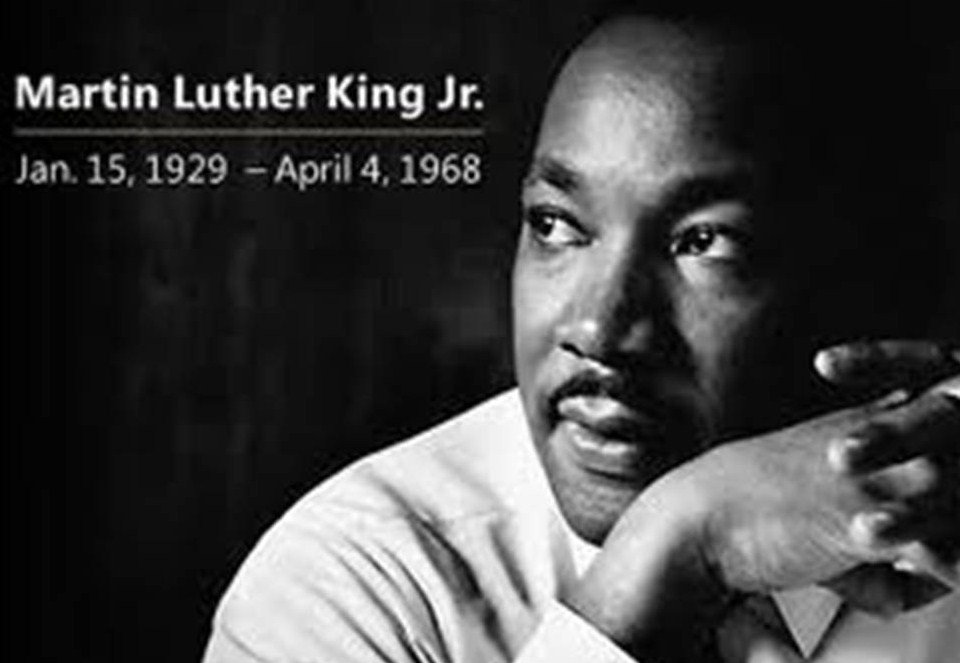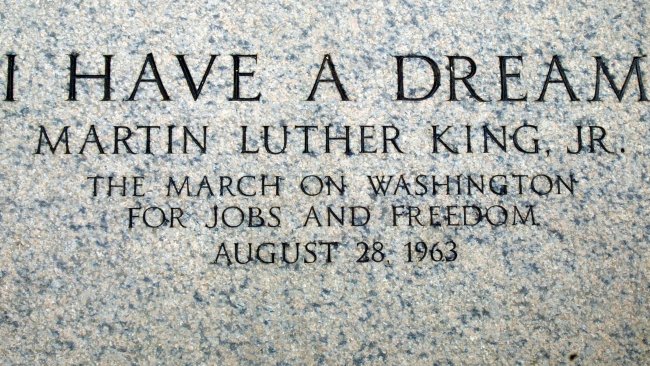
Photo:bing.com
“Martin Luther King JR: Ecological Thinker”
I offer this in honour of Black History Month
And of our forthcoming coming conference in Lucca, Tuscany, 28 August-1 September 2018
“All I'm saying is simply this, that all life is interrelated, that somehow we're caught in an inescapable network of mutuality tied in a single garment of destiny. Whatever affects one directly affects all indirectly. For some strange reason, I can never be what I ought to be until you are what you ought to be. You can never be what you ought to be until I am what I ought to be. This is the interrelated structure of reality.”~ Dr. Martin Luther King, Jr, 1965
"It really boils down to this: that all life is interrelated."
‘Reading through his consistent references to the universe and the cosmos, to interrelatedness, interdependence, and connectedness, to mutuality and participation, an inescapable conclusion dawned on me: Martin Luther King was an ecological thinker.’
"We've played havoc with the destiny of the world," he said in his last months. "Somewhere we must make it clear that we are concerned about the survival of the world."
“Martin Luther King JR: Ecological Thinker”*
…”He was also a cosmological thinker with a deep interest in the universe. As early as the Montgomery Bus Boycott in 1956, King said, “The fact that this new age is emerging reveals something basic about the universe. It tells us something about the core and heartbeat of the cosmos.” As I studied King’s words, it also became clear that his vision was essentially one of connectedness. Along with his well-known worldview of prophetic Christianity, interconnection and interdependence were central to his thinking, and consistent themes in his rhetoric. King saw reality as an interlacing network of relationships, viewed the nations and peoples of the planet as one, and linked various social injustices, saying, “All of these problems are tied together.” “One cannot be concerned just with civil rights. It is very nice to drink milk at an unsegregated lunch counter—but not when there’s Strontium 90 in it.”
A few scholars have noted the ecological quality of King’s thought. In a 2006 speech, Larry Rasmussen, author of the recent book Earth-Honoring Faith, called King “one of the great ‘ecological’ thinkers of the 20th century,” while noting our failure to remember him as such. Other scholars such as Dianne Glave and Robert Bullard highlight King’s involvement with the Memphis sanitation workers’ strike as “inherently environmental” and a precursor of 21st century environmental justice activism. Apart from these brief mentions, the ecological nature of his thought has remained largely unexplored.
One of the best examples of King’s ecological view, and the links he draws between connectedness, justice, and nonviolence, is his “Christmas Eve Sermon on Peace,” delivered in the last months of his life from his pulpit at Ebenezer Baptist Church in Atlanta. “If we are to have peace on earth,” he told the congregation, “we must develop a world perspective. . . . Yes, as nations and individuals, we are interdependent.” Then, with a sentence that could easily have been uttered by John Muir or Rachel Carson, King states, “It really boils down to this: that all life is interrelated.”
Continuing with lines also used in his famous “Letter from Birmingham Jail” five years earlier, Kings says, “We are caught in an inescapable network of mutuality, tied into a single garment of destiny. Whatever affects one directly, affects all indirectly.”
King’s phrase, “network of mutuality,” is perhaps as good a definition of ecology as any offered by an ecologist. Is it possible that recovering the ecological and cosmological dimensions of King’s vision could help inspire our present work to link issues, connect ecology and social justice, and build a culture with a viable future?
King and the Cosmos
Throughout his life King was interested in the grandeur of the cosmos. For him, the universe was a source of awe and spirituality. His religious worldview embraced modern scientific cosmology, while rejecting what he saw as the soulless materialism of modernity. He appreciated the wonders of astronomy, but refuted the meaninglessness of the scientific worldview.
In the King Center’s online archives there are notecards, written in his hand, rhapsodizing about, “all this galaxy of wonders.” On another card, King writes of “stars that guide sailors in storms; stars that enrapture astrologers as they ponder the Zodiac; stars of the Milky Way; stars that thrill the hearts of poets.”
How did King relate his sense of the cosmos to the struggle against racism and the movement’s work for social justice? He created a cosmology of justice by joining the imperative for justice to the structure of the universe. In his vision, the civil rights movement always had a cosmological dimension. He often maintained that we have “cosmic companionship” in the struggle for justice and that “the universe is on the side of justice.” In King’s worldview, the calls for peace, for justice, and for compassionate action are woven into the fabric of the cosmos itself.
King’s overarching view of justice expressed itself on the social level as human solidarity, and for him, the new era taking shape through the civil rights movement provided confirmation of his cosmic view. Because white supremacy goes against our cosmological unity, King predicted the “inevitable decay of any system based on principles that are not in harmony with the moral laws of the universe.” He believed that “somehow the universe is on the side of all that’s moving toward justice and dignity and goodwill and respect.”
King and Ecology
King did not live to witness the groundswell of 20 million Americans participating in Earth Day 1970. He never saw the pictures of earth from space or heard Marvin Gaye and Joni Mitchell singing environmental anthems on mainstream radio. But despite the fact that he was killed before the popular emergence of environmental thought and perception, we can see in King’s work early indications of ecological consciousness and environmental concerns. “The cities are gasping in polluted air and enduring contaminated water,” King warned in 1967, in a statement that foreshadowed the environmental justice movement of the following decades.
King’s sacred view of nature, based in African American tradition, aligns with African and other indigenous traditions, mystical traditions, and much of the eco-spiritual thinking that would later develop. “Although God is beyond nature he is also immanent in it,” King wrote. “Probably many of us who have been so urbanized and modernized need at times to get back to the simple rural life and commune with nature... We fail to find God because we are too conditioned to seeing man-made skyscrapers, electric lights, aeroplanes, and subways.”
Along with protesting the alienation of the industrial world, King voiced opposition to the ecological threat posed by nuclear testing and the specter of nuclear war: “We’ve played havoc with the destiny of the world,” he said in his last months. “Somewhere we must make it clear that we are concerned about the survival of the world.”
In King’s view, the best hope for the future involved building mass, direct-action movements for justice. This would require connecting not only people, but issues and movements as well, expanding to encompass the planet itself. In a television interview from July 1967, King said, “It would be foolhardy for me to work for integrated schools or integrated lunch counters and not be concerned about the survival of the world in which to be integrated.”
King’s statements on ecology and the environment, made before the explosion of ecological thinking, are not a detailed program, but rather hints and glimpses—significant ones nonetheless. Although the ecological and cosmological themes in his work were never fully developed, King’s vision was ahead of its time in linking cosmology, social justice, and ecological consciousness.
The ecological and cosmological teachings of Dr. King have much to offer us as we work for positive transformation in our times. But honoring King’s cosmology of connection means not only recovering his ecological dimensions, but also engaging his critiques of militarism, poverty, and structural racism. As King told us, “justice is indivisible,” because ultimately, “we are tied together.”

photo:bing.com
Living the Dream: "So even though we face the difficulties of today and tomorrow, I still have a dream."…
Martin Luther King: GCGI remembers 'I Have a Dream' speech
"The whirlwinds of revolt will continue to shake the foundations of our nation until the bright day of justice emerges. Let us not seek to satisfy our thirst for freedom by drinking from the cup of bitterness and hatred.”
Fifty five years ago the American civil rights leader Martin Luther King delivered his powerful and magnificent 'I have a dream' speech on the steps of the Lincoln Memorial in Washington DC. It was an event that not only changed the United States of America, but that also had a profound impact on the rest of the world. On that historical day in August 1963, in what was to that point the largest public protest in the history of the US, more than 200,000 Americans joined a march on Washington DC demanding equal justice for all citizens under the law. On that day, the interracial crowd heard Martin Luther King deliver his famous speech, predicting a time when freedom and equality for all would become a reality in the US. The very next year in 1964 Congress passed the Civil Rights Act outlawing all forms of discrimination against racial, ethnic, national and religious minorities, and outlawing discrimination against women in the US.
Fifty five years later, in August/September 2018 in Lucca, Tuscany, we will be holding the 14th GCGI International Conference, and our 4th Joint GCGI-SES Forum. The main Conference’s theme is ‘OUR SACRED EARTH:‘ Spiritual Ecology, Values-led Economics, Education and Society Responding to Ecological Crisis’, a theme, I am sure, very close to Dr. King’s heart and concerns.
Dr. King’s dream is also our dream. Thus, with hope for a better future and joining with the spirit of Dr. King and all who have struggled across the generations for justice, we will, during the Conference period, remember the “I have a dream” speech and Dr. King’s Interconnected World.
Moreover, when reflecting on our Conference, our global community and the common good, I am often also reminded about the “Beloved Community” as described by Martin Luther King, Jr.:
‘Dr. King’s Beloved Community is a global vision, in which all people can share in the wealth of the earth. In the Beloved Community, poverty, hunger and homelessness will not be tolerated because international standards of human decency will not allow it. Racism and all forms of discrimination, bigotry and prejudice will be replaced by an all-inclusive spirit of sisterhood and brotherhood. In the Beloved Community, international disputes will be resolved by peaceful conflict-resolution and reconciliation of adversaries, instead of military power. Love and trust will triumph over fear and hatred. Peace with justice will prevail over war and military conflict.’ (From The King Center)
Therefore, it is, with this deep conviction, that, I call for dialogue among all stakeholders. My appeal is inspired by a humanistic vision, based on respect for life and human dignity, equal rights, social justice, cultural diversity, international solidarity, and shared responsibility for a sustainable future. These are the fundamentals of our common humanity, and of our GCGI family.
There is no better or fitting way to celebrate and salute the life and work of Martin Luther King than to embrace the dream of greater and ever evolving justice for all and to join the struggle to make that better world a reality.
We would be delighted and honoured if you consider joining us at our Lucca, 2018 Conference, sharing your wisdom, insight, experience and story with us all.
Prof. Kamran Mofid, Founder, Globalisation for the Common Good Initiative (GCGI)
*“Martin Luther King JR: Ecological Thinker”- By Drew Dellinger
I am grateful to, and thank Drew Dellinger, for this excellent article.
